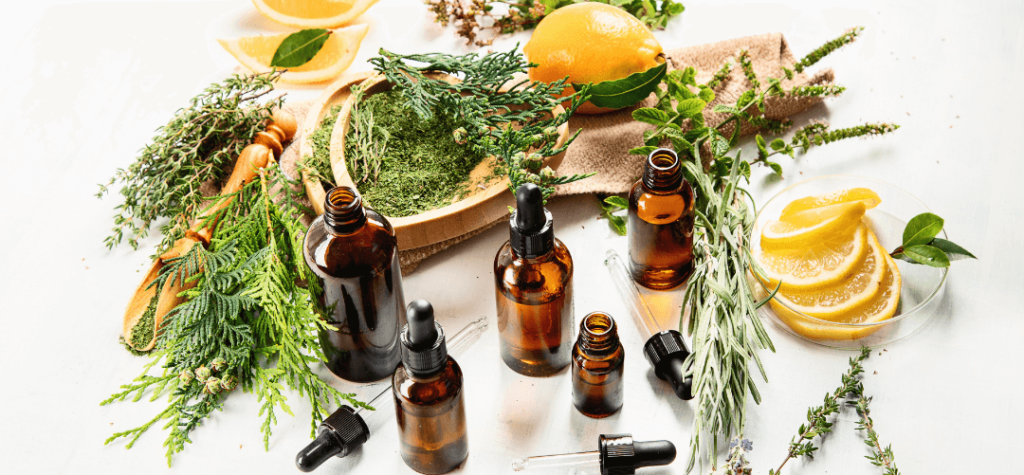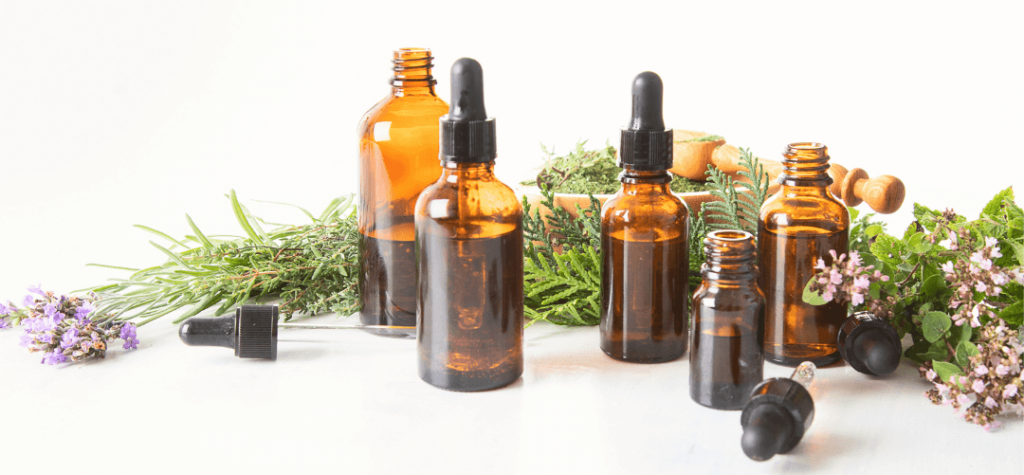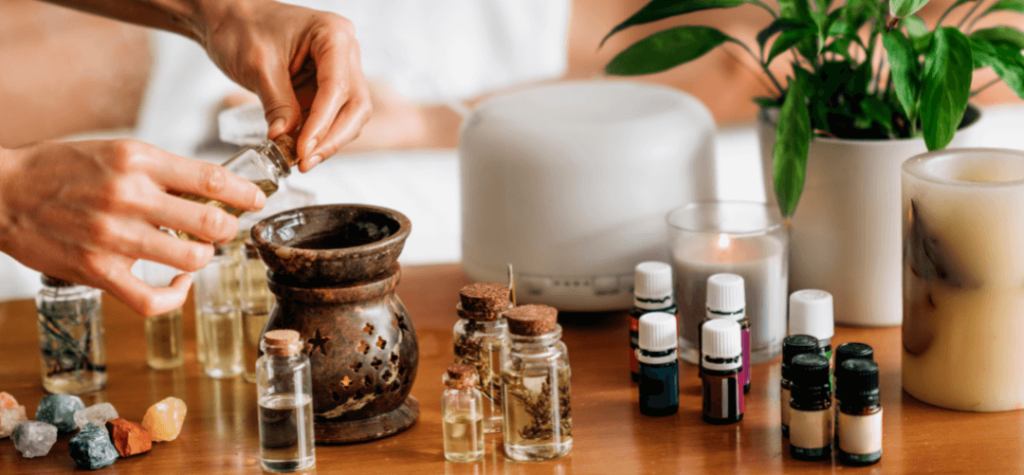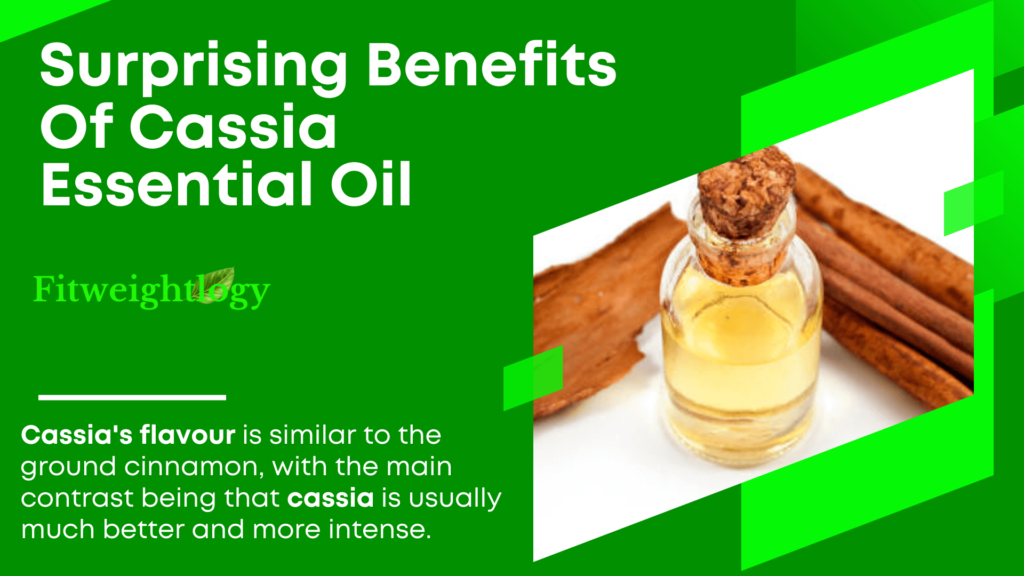What Are The Health Benefits Of Essential Oils – Aromatherapy Method
Essential oils are highly concentrated plant extracts that are believed to have therapeutic properties. They are often used in aromatherapy, a practice that involves using the scents of essential oils to promote relaxation and well-being. What are the health benefits of essential oils?
Some common essential oils used in aromatherapy include lavender, peppermint, and tea tree oil. These oils are thought to have calming effects, and they may be used to help people relax, improve sleep, and reduce stress.
In addition to their use in aromatherapy, essential oils are sometimes used topically or applied directly to the skin.
Some people believe that applying essential oils to the skin can help to soothe muscle aches and pains, reduce inflammation, and even improve skin conditions like acne.
However, it’s important to dilute essential oils before applying them to the skin, as they are highly concentrated and can cause irritation if used undiluted.
Essential oils are sometimes taken orally, either by adding a few drops to a glass of water or using them in a capsule.
However, it’s important to be cautious when taking essential oils orally, as they can be toxic if ingested in large amounts. It’s always best to consult a healthcare provider before taking essential oils orally.
While some people may find relief from using essential oils, it’s important to remember that they are not replacements for medical treatment and should be used with caution.
Overall, the potential health benefits of essential oils are still being studied, and more research is needed to understand their effects fully.
What Are Essential Oils?

Essential oils are concentrated liquids containing plants’ natural, aromatic compounds. They are typically extracted from the flowers, leaves, stems, roots, or other parts of a plant and are often used in natural remedies and beauty products.
The use of essential oils dates back to ancient civilizations, and they have been used for a variety of purposes, including perfumery, religious rituals, and traditional medicine.
Today, essential oils are used in a wide range of products, including candles, soaps, lotions, and hair care products.
Some people also use essential oils for aromatherapy, which is the practice of using the natural fragrances of essential oils to promote physical and psychological well-being.
There are many different types of essential oils, each with its unique scent and potential health benefits. Some of the most common essential oils include lavender, peppermint, tea tree, and eucalyptus.
These oils are often used for their relaxing or soothing effects and can be applied to the skin or inhaled through the use of a diffuser.
What Is Aromatherapy?
Aromatherapy is a type of holistic medicine that treats the body as a whole rather than focusing on just one specific symptom or illness. It is based on the idea that the natural fragrances of essential oils can positively affect the mind and body.
The oils are believed to be absorbed through the skin or inhaled, where they then enter the bloodstream and interact with the body’s hormones and nervous system.
Aromatherapy is commonly used in a number of settings, including spas, hospitals, and even in some people’s homes. It is often used in conjunction with other forms of complementary and alternative medicine, such as massage and acupuncture.
To use aromatherapy, essential oils are typically mixed with a carrier oil, such as almond oil or jojoba oil, and then applied to the skin or inhaled through the use of a diffuser. Some people also add oils to their bathwater or use them in a compress.
While aromatherapy is generally considered safe, it is important to remember that essential oils are highly concentrated and irritating if used in large quantities or if not diluted properly.
It is also important to be cautious when using essential oils if you are pregnant or have a medical condition. It is always best to consult a qualified aromatherapist or healthcare provider before using essential oils.
What Are The Health Benefits Of Aromatherapy?
Aromatherapy is believed to have many potential health benefits, including reducing anxiety and stress, improving sleep, boosting energy levels, and enhancing the immune system.
It is also believed to have anti-inflammatory and pain-relieving properties, which may be helpful for people with chronic pain conditions.
While there is limited scientific evidence to support the effectivene use of aromatherapy for specific

health conditions, some studies have shown that it may be helpful for certain conditions.
For example, one study found that aromatherapy with lavender essential oil may help reduce anxiety and improve sleep in people with post-traumatic stress disorder.
Another study found that aromatherapy with peppermint oil may help reduce nausea and vomiting in cancer patients undergoing chemotherapy.
Aromatherapy is generally safe when used as directed. However, it is important to use essential oils carefully, as they can be highly concentrated and may cause skin irritation or allergic reactions in some people.
Choosing high-quality essential oils and diluting them properly before use is also important. If you are interested in trying aromatherapy, it is a good idea to talk to your healthcare provider first to make sure it is safe and appropriate for you.
In addition to the potential health benefits of aromatherapy, many people find that the pleasant scent of essential oils can help create a calming and soothing atmosphere, which can help promote relaxation and stress relief.
Some people also find that using essential oils in their home or workspace can help improve the overall ambiance and create a more pleasant environment.
In aromatherapy, essential oils are typically used in one of two ways: through inhalation or topical application.
Inhalation involves inhaling the scent of essential oils, either directly from the bottle or using a diffuser to disperse the oil into the air.
The topical application consists in applying the essential oil directly to the skin, often mixed with a carrier oil to dilute it.
How Can You Use Essential Oils Safely?
When used properly, essential oils can be safe and effective. However, it is important to use them carefully and follow certain guidelines to avoid potential risks or side effects. Here are some tips for using essential oils safely:
1. Dilute essential oils before using them on the skin: Essential oils should always be diluted with a carrier oil (such as jojoba oil or sweet almond oil) before applying them directly to the skin. It will help to prevent irritation and sensitivity. The recommended dilution ratio is typically between 1% and 2%, which means adding 12-24 drops of essential oil to 1 ounce of carrier oil.
2. Use a patch test before trying a new essential oil: It is always a good idea to do a patch test before using a new essential oil to ensure that you are not allergic or sensitive to it. To do a patch test, apply a small amount of the diluted essential oil to a small area of your skin, such as the inside of your elbow, and wait 24 hours to see if there is any reaction. Do not use the oil if your skin becomes red, itchy, or irritated.
3. Avoid using essential oils near the eyes and mucous membranes: Essential oils should never be used near the eyes or on mucous membranes, such as the inside of the nose or mouth, as they can be irritating and cause discomfort. If you accidentally get the essential oil in your eyes, rinse them thoroughly with water.
4. Be cautious when using essential oils on children and pets: Essential oils should be used with caution on children and pets, as their skin and bodies may be more sensitive to them. Always dilute the oils properly and use them in moderation. It is also important to keep essential oils out of reach of children and pets to prevent accidental ingestion.
5. Store essential oils properly: Essential oils should be stored in a cool, dry place, away from heat and sunlight. They should also be kept in their original, labeled containers to prevent mix-ups and accidental ingestion.
The key to using essential oils safely is to be mindful and cautious. Follow the guidelines above, and always consult a healthcare provider or aromatherapist if you have any questions or concerns.
Popular Essential Oil Blends

Many popular essential oil blends are used for a variety of purposes. Some of the most popular combinations include:
- Lavender and chamomile: This blend is known for its calming and relaxing effects, making it a popular choice for aromatherapy and promoting sleep.
- Peppermint and eucalyptus: This blend is often used to help with congestion and respiratory issues, making it a popular choice for use in vapor rubs and other respiratory remedies.
- Lemon and rosemary: This blend is known for its energizing and stimulating effects, making it a popular choice in diffusers to help boost energy and focus.
- Frankincense and myrrh: This blend is often used for its spiritual and emotional benefits and is a popular choice for meditation and mindfulness practices.
Some other popular blends include:
- Tea tree and lavender: This blend is often used for its antimicrobial and anti-inflammatory properties, making it a popular choice for skin care products and treating acne and other skin conditions.
- Orange and clove: This blend is known for its uplifting and warming effects, making it a popular choice for diffusers during the fall and winter.
- Geranium and ylang-ylang: This blend is often used for its balancing and hormone-regulating effects, making it a popular choice for use in natural skincare and beauty products.
· Rose and sandalwood: This blend is known for its soothing and romantic effects, making it a popular choice for perfumes and other fragrances.
As with any essential oil blend, it’s important to use caution and consult a qualified aromatherapist or healthcare provider before using these blends.
It’s also important to carefully read and follow the instructions for any essential oil product, as improper use can lead to adverse effects.
What Makes Essential Oils Effective?
Essential oils are effective for a variety of reasons. First and foremost, they are highly concentrated plant extracts that contain the natural compounds and aromas of the plant from which they are derived.
These compounds can have powerful effects on the body and mind. They can be used for a wide range of purposes, from promoting relaxation and reducing stress to boosting energy and improving mental clarity.
Additionally, essential oils are easily absorbed by the skin, making them a popular choice for topical application. When applied to the skin, they can penetrate the cells and tissues, allowing them to interact with the body on a molecular level.
It allows the compounds in essential oils to target specific areas of the body and provide particular health benefits.
Essential oils are also highly volatile, so they evaporate quickly when exposed to the air. This allows the oil’s aroma to be easily inhaled, which can directly affect the brain and nervous system.
Inhaling essential oils can help promote feelings of calm and relaxation and can also help clear the airways and improve respiratory health.
Do Hospitals Allow Essential Oils?
Hospitals generally do not allow patients to use essential oils, as they are not considered safe or effective treatments.
There is little scientific evidence to support the use of essential oils for medical purposes. It is always best to talk to your doctor about any medical concerns and follow their advice regarding treatment.
While hospitals may not allow patients to use essential oils, some healthcare providers may recommend using certain essential oils as part of a holistic treatment plan.
However, it is important to note that we should only use essential oils under the guidance of a qualified healthcare professional who is trained in their use.
Additionally, essential oils should never be used as a substitute for medical treatment or as a way to self-diagnose or self-treat medical conditions.
Always talk to your doctor before using essential oils, and follow their instructions carefully.
It is important to understand that essential oils are not regulated by the Food and Drug Administration (FDA) in the same way that medications are.
It means that the quality and safety of essential oils can vary greatly, and it is important to purchase essential oils from a reputable source.
It is also important to remember that essential oils should never be used on infants or young children without the guidance of a qualified healthcare professional.
Essential oils can be very potent and can be dangerous if used improperly. We should not use some essential oils on certain individuals, such as pregnant or breastfeeding women or people with certain medical conditions.
What Are The Health Benefits Of Essential Oils?

Some people use essential oils to help with a variety of health conditions, including stress, anxiety, and insomnia.
Some studies have also suggested that certain essential oils may have antimicrobial and anti-inflammatory properties, which could benefit skin conditions like acne and eczema.
However, it’s important to note that the research on the health benefits of essential oils is still limited, and more studies are needed to understand how they can be used for medical purposes fully.
Additionally, essential oils should always be used with caution and under the guidance of a healthcare professional.
Some essential oils can be irritating to the skin, and others can be toxic if ingested. It’s important to read the instructions on the label and follow the recommended usage guidelines.
In general, essential oils should be diluted in a carrier oil, such as almond oil or jojoba oil, before being applied to the skin.
It’s also important to do a patch test on a small skin area before using essential oil to ensure you don’t have an allergic reaction.
In addition to being used on the skin, some people also use essential oils in aromatherapy, where the oils are inhaled through the nose to help with various conditions.
However, there is limited scientific evidence to support the use of essential oils for aromatherapy, and more research is needed to understand how they may use them for this purpose.
It means that the quality and purity of essential oils can vary, and it’s important to buy them from reputable sources.
However, some people find that using essential oils can help them manage certain health conditions or provide a sense of relaxation and well-being.
It’s important to remember that essential oils should not be used as a substitute for medical treatment, and you should always consult a healthcare provider before using them.
If you decide to try using essential oils, be sure to follow the recommended usage guidelines and use them with caution.
What Are The Potential Side Effects Of Essential Oils?
Some of the potential side effects of essential oils include skin irritation, allergic reactions, and the worsening of certain medical conditions.
It is important to always dilute essential oils with a carrier oil before applying them to the skin and to consult with a healthcare provider before using them if you have a medical condition or are pregnant or breastfeeding. Additionally, it is important only to use high-quality, pure essential oils and to avoid using them near the eyes, ears, or other sensitive areas of the body.
Some other potential side effects of essential oils include:
- Skin irritation: Essential oils can cause irritation or sensitivity when applied directly to the skin, especially if not diluted properly. It can lead to redness, itching, and other forms of discomfort.
- Allergic reactions: Some people may be allergic to certain essential oils, and using these oils can cause allergic reactions such as rashes, hives, or difficulty breathing.
- Worsening of medical conditions: Some essential oils can interfere with certain medications or medical conditions, such as epilepsy or high blood pressure. It is important to consult with a healthcare provider before using essential oils if you have a medical condition.
- Toxicity: In rare cases, essential oils can be toxic if ingested or used in large amounts. It can lead to symptoms such as nausea, vomiting, and dizziness.
It is important to use essential oils with caution and follow the label’s instructions. If you experience any adverse reactions after using essential oils, stop using them and consult with a healthcare provider.
Who Might Want To Use Essential Oils As A Complementary Therapy?

Essential oils are often used as a complementary therapy for a variety of health concerns by many different types of people. Obviously, it is ultimately a personal choice.
People with chronic illnesses such as cancer, fibromyalgia, and arthritis may find that essential oils help to reduce pain and improve their overall well-being.
People looking to reduce stress, anxiety, and depression may also find relief from using essential oils. Additionally, those who have insomnia or other sleep disturbances may benefit from using essential oils during the night.
Athletes can also use essential oils to reduce muscle tension and improve circulation after physical activity.
Finally, while some essential oils should be avoided during pregnancy, as others may cause allergic reactions in certain individuals, pregnant women may use certain essential oils during labor or postpartum to help manage pain or promote relaxation.
Ultimately, anyone looking for an alternative approach to improving their mental or physical health may benefit from the therapeutic effects of essential oil use.
Can You Use Essential Oils In Place Of Prescription Medication? Does Insurance Cover It?
It is not generally recommended to use essential oils in place of prescription medication. Essential oils are not a substitute for medical treatment and should not be used as such.
It is important to consult with a healthcare provider before making any changes to your medication regimen.
Insurance coverage for using essential oils varies depending on the specific plan.
Some insurance providers may offer coverage for certain complementary and alternative medicine types, while others may not. It is always best to check with your insurance provider to determine what is covered under your plan.
In addition to consulting with a healthcare provider and checking with your insurance provider, there are a few other important things to consider when using essential oils.
First, it is important to use essential oils safely. They are highly concentrated and can be irritating to the skin if not used properly.
It is best to dilute essential oils with a carrier oil, such as coconut or almond oil, before applying them to the skin. It is also important to avoid getting essential oils in the eyes or mucous membranes.
Second, the quality of essential oils can vary greatly. Some essential oils on the market may be adulterated or contaminated, so purchasing them from a reputable source is important.
Look for essential oils labeled as “therapeutic grade” or “certified pure” to ensure that you are getting a high-quality product.
Finally, keep in mind that essential oils are not a cure-all.
What Are The Popular Types Of Essential Oils?

Some of the most popular essential oils include lavender, peppermint, tea tree, lemon, and eucalyptus. These oils are used for a variety of purposes, including aromatherapy, skincare, and natural cleaning products.
In addition to the oils mentioned earlier, some other popular essential oils include:
- Rosemary oil: It is often used for its stimulating and invigorating properties. It is also believed to have several potential health benefits, such as improving memory and supporting healthy hair growth.
- Frankincense oil: This oil has a warm, spicy aroma and is often used in aromatherapy for its calming and relaxing effects. It is also believed to have some potential health benefits, such as supporting the immune system and promoting healthy skin.
- Cedarwood oil: This oil has a woodsy, earthy aroma and is often used in aromatherapy to promote feelings of grounding and stability. It is also believed to have a number of potential health benefits, such as supporting healthy respiratory function and promoting healthy skin.
These are just a few examples of the many types of essential oils available. There are many others to choose from, each with its unique aroma and potential benefits.
What Are The Health Benefits Of Essential Oils – Conclusion
Essential oils offer a wide range of benefits that can improve our physical, emotional, and mental well-being. They can be used for various purposes, such as aiding in relaxation, promoting healthy skin and hair, and supporting a healthy immune system.
Some common essential oils and their benefits include lavender for relaxation, tea tree for healthy skin, and peppermint for digestive support.
Essential oils can be used in a variety of ways, including diffusion, topical application, and internal consumption. It is important to consult with a healthcare professional before using essential oils, especially if you are pregnant, nursing, or have any underlying health conditions.
Additionally, essential oils are a natural and environmentally friendly alternative to synthetic chemicals commonly found in household and personal care products.
They are derived from plants and are free of harmful chemicals, making them safe for use around children and pets. They can also be used to create homemade cleaning and personal care products, which can help reduce the number of synthetic chemicals in your home.
Furthermore, using essential oils can also provide a sense of connection to nature and the environment. Many people feel calm and relaxed when using essential oils, which can be attributed to their natural, plant-based origins.
Aromatherapy involves using essential oils for their therapeutic benefits, has been practiced for centuries, and can provide a holistic approach to health and well-being.
Overall, incorporating essential oils into your daily routine can be a natural and effective way to support your overall health and well-being.
 | Fitweightlogys content writers team constantly contributes to writing high-quality content linked with all the best products associated with weight loss, healthy lifestyle, fitness, tips, and motivation. Furthermore, provide tips on beauty and nutrition. |
Latest Posts
- What to Eat at KFC: Healthy Menu Choices and Nutrition Facts
- 18 Best Essential Oils For Neck And Back Pain Relief – The Highly Effective Guide
- Health Benefits of Fenugreek Oil for Hair, Digestion, Inflammation & More
- What Is Meringue Powder? – What About Meringue Powder Substitutes?
- What Does A 6 Foot 300 Pound Man Look Like?
- The 15 Best Premium Shampoos for Men In 2022, According To Experts
- 15 Best Premium Shampoos For Women In 2022, According To Experts
Posted in
Welcome to Fitweightlogy! We are an optimum review website of all the best products associated with weight loss, healthy life, fitness, tips, and motivations. We are a quickly developing organisation given that we typically put our visitors first. A customer-focused experience has regularly been our objective, and we value our comprehensive policies, which have placed us in a domain well beyond our competitors. On this website, we assist our visitors in reaching their desired weight, appearance goals and live a healthy lifestyle, as well as save money and time by meticulously researching and evaluating the market, assessing the available products, and producing informative recommendations based on factors such as quality, availability, price and more. Furthermore, our passion is to assist you in choosing the best possible product through our product reviews.








